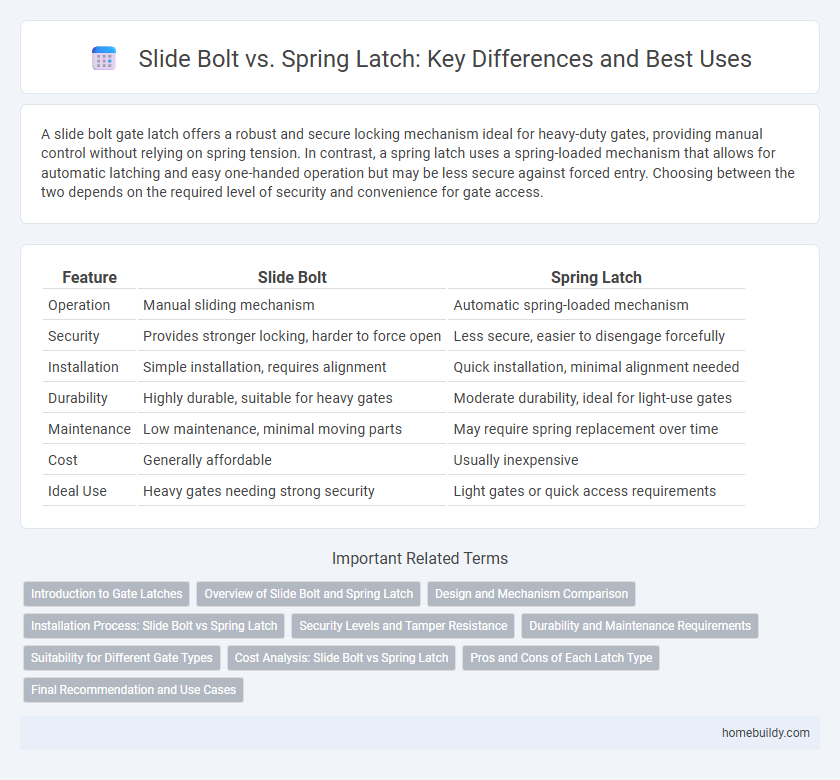A slide bolt gate latch offers a robust and secure locking mechanism ideal for heavy-duty gates, providing manual control without relying on spring tension. In contrast, a spring latch uses a spring-loaded mechanism that allows for automatic latching and easy one-handed operation but may be less secure against forced entry. Choosing between the two depends on the required level of security and convenience for gate access.
Table of Comparison
| Feature | Slide Bolt | Spring Latch |
|---|---|---|
| Operation | Manual sliding mechanism | Automatic spring-loaded mechanism |
| Security | Provides stronger locking, harder to force open | Less secure, easier to disengage forcefully |
| Installation | Simple installation, requires alignment | Quick installation, minimal alignment needed |
| Durability | Highly durable, suitable for heavy gates | Moderate durability, ideal for light-use gates |
| Maintenance | Low maintenance, minimal moving parts | May require spring replacement over time |
| Cost | Generally affordable | Usually inexpensive |
| Ideal Use | Heavy gates needing strong security | Light gates or quick access requirements |
Introduction to Gate Latches
Slide bolt gate latches offer a simple, secure mechanism that relies on manually sliding a bolt into place, providing robust resistance to forced entry. Spring latches feature a spring-loaded mechanism that automatically locks the gate when closed, enhancing convenience but requiring compatible hardware for effective security. Selection between slide bolt and spring latch depends on desired security level, ease of use, and gate style.
Overview of Slide Bolt and Spring Latch
Slide bolts provide a manual locking mechanism that secures gates by sliding a metal bar into a catch or bracket, offering strong physical resistance against forced entry. Spring latches use a self-engaging mechanism with a spring-loaded bolt that automatically locks when the gate closes, enabling quick and convenient operation without needing to manually slide the latch. Both types are commonly used in residential and commercial gates, but slide bolts prioritize robust security while spring latches focus on ease of use and automatic locking.
Design and Mechanism Comparison
Slide bolts feature a straightforward mechanical design involving a solid metal rod that manually slides into a catch or bracket, providing a secure and sturdy gate latch suitable for high-security needs. Spring latches utilize a spring-loaded bolt that automatically snaps into place when the gate closes, offering quick, hands-free locking but with less resistance to forced entry compared to slide bolts. The slide bolt's manual operation ensures stronger physical security while the spring latch prioritizes convenience and ease of use with automatic engagement.
Installation Process: Slide Bolt vs Spring Latch
Installing a slide bolt gate latch involves securing the bolt mechanism directly onto the gate and corresponding frame with screws, requiring precise alignment to ensure smooth sliding action. The spring latch installation necessitates mounting the latch body and strike plate, often demanding careful calibration of spring tension for optimal automatic closure and secure locking. Slide bolts generally offer a straightforward installation with fewer adjustable components, while spring latches may require more detailed setup to balance functionality and durability.
Security Levels and Tamper Resistance
Slide bolts provide higher security levels compared to spring latches due to their robust construction and resistance to forced entry, making them ideal for securing gates in high-risk areas. Spring latches, while convenient and easy to operate, offer lower tamper resistance as they can often be bypassed with simple tools or pressure. Choosing a slide bolt enhances gate security by minimizing vulnerabilities against tampering and unauthorized access attempts.
Durability and Maintenance Requirements
Slide bolts offer superior durability due to their simple mechanical design and robustness against weather conditions, making them less prone to rust and mechanical failure. Spring latches require more frequent maintenance because their internal springs can weaken or corrode over time, potentially leading to reduced functionality and the need for regular lubrication. Choosing a slide bolt latch minimizes long-term upkeep and ensures consistent performance in outdoor gate applications.
Suitability for Different Gate Types
Slide bolts offer robust security and are ideal for heavy or metal gates where strength and durability are crucial, making them suitable for large garden or industrial gates. Spring latches provide convenience for frequently used residential wooden or chain-link gates, allowing easy one-handed operation without compromising basic security. Choosing between slide bolts and spring latches depends on gate material, frequency of use, and required level of security.
Cost Analysis: Slide Bolt vs Spring Latch
Slide bolts typically cost less upfront than spring latches, making them a budget-friendly choice for gate security. Spring latches often involve higher installation and maintenance expenses due to their mechanical components. Evaluating long-term durability and potential repair costs is crucial when comparing the overall cost-effectiveness of slide bolts versus spring latches.
Pros and Cons of Each Latch Type
Slide bolts offer robust security with a simple mechanical design, making them highly reliable for heavy-duty gate applications; however, they require manual operation, which can be less convenient for frequent use. Spring latches provide ease of use with automatic locking mechanisms, ideal for quick access, but they may be less secure against forced entry and can wear out faster in outdoor environments. Choosing between these latches depends on balancing the need for security and convenience based on gate usage and location.
Final Recommendation and Use Cases
Slide bolts offer superior security and durability, making them ideal for heavy-duty gates and high-traffic areas requiring reliable locking mechanisms. Spring latches provide convenience and quick automatic closure, suitable for residential gates or areas needing frequent access without compromising basic security. For permanent installations where security is paramount, slide bolts are recommended, while spring latches excel in applications favoring ease of use and moderate security.
slide bolt vs spring latch Infographic

 homebuildy.com
homebuildy.com